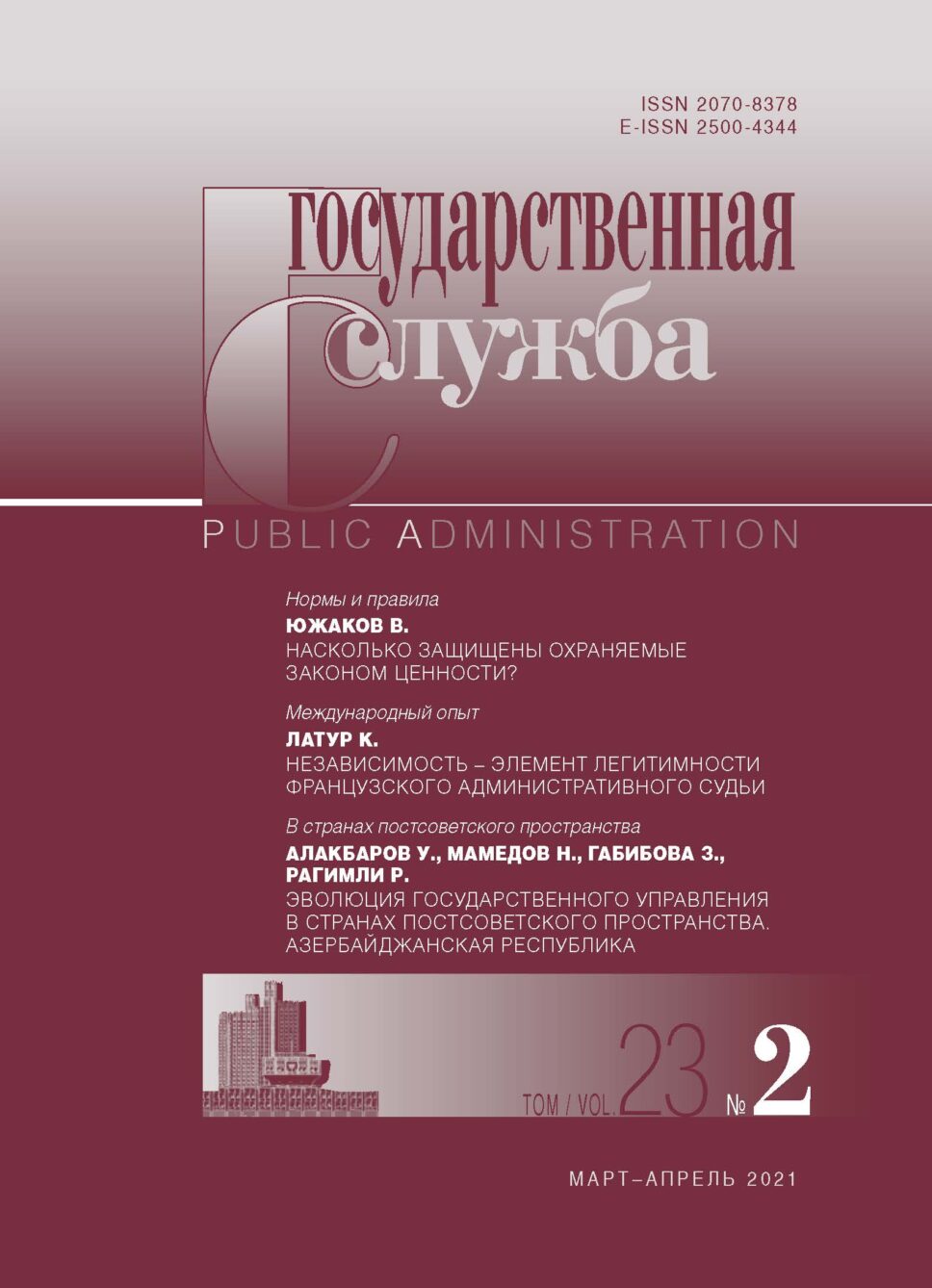Recommended link to article:
URKHAN KAZIM OGLU ALAKBAROVа
ZIYAFAT ZIA KYZY GABIBOVAа
RAJAB ZAKIR OGLU RAHIMLIа
аAcademy of public administration under the President of the Republic of Azerbaijan
NIZAMI MUSTAFA OGLU MAMMADOVb
bRussian presidential Academy of national economy and public administration
DOI: 10.22394/2070-8378-2021-23-2-97-118
Abstract:
In the article, the formation and development of public administration in the Azerbaijan Republic is considered, firstly, in the context of the country’s history and culture, its natural, geographical, social, economic features; secondly, through the prism of the principles of sustainable development and the emerging trend in the formation of e-government. It is shown that over the years since independence, the Republic has managed to resolve a number of internal and external political problems, to overcome the consequences of a severe systemic crisis of the 1990s. Invariably the focus of attention of state bodies over the years has been economic issues, the problems of its diversification and the social and humanitarian sphere, its state, prerequisites and conditions for development. A comparative analysis based on official reports of international organizations shows that a number of important economic and social indicators of Azerbaijan are now at the same level as those of the G7 countries. The achieved level of economic development and implemented successful social policy became possible due to the formation of an adequate system of state and municipal government in the Republic. The article reveals the connection between the formation of an effective public administration system and the spiritual, moral, and cultural condition of society. The support by citizens of public administration structures on the basis of trust creates a positive situation of synergy of management and social self-organization. It is emphasized that maintaining a sustainable development of society, its inclusive nature is possible with an advanced personnel policy in the field of public administration and the use of innovative technologies.
Keywords:
Azerbaijan, Azerbaijan Republic, public administration, trust in public service, sustainable development, indicators of sustainable development, standard of living, quality of life, inclusive society, e-government
Received:
July 2, 2020
References:
Azimov K.A. The Valuable World of Man in the Religious and Philosophical Doctrine of Zoroastrianism. Baku, 1991.
Alakbarov U.K. Sustainable inclusive development in the Republic of Azerbaijan and the countries of the former USSR: a comparative analysis. Public administration (Azerbaijan), 2020. No. 1 (69). P. 123–138.
Alakbarov U.K. Foundations of the management of inclusive development. Baku: Tahsil, 2018.
Alakbarov U.K. Fundamentals of sustainable development and ecological civilization. Baku: Tahsil, 2013.
Alakbarov U.K. Sustainable inclusive development of Azerbaijan: the value of human resources. Public administration. 2019. Vol. 21. No. 5. P. 6–11.
Gabibova Z.Z. Human potential as the basis of the ideology of development. Baku: Aspoliqraf, 2014.
Gabibova Z. Human potential: from the ideology of growth to the ideology of development. Moscow: Nauka, 2018.
Grünbaum G.E. fon. The main features of the Arab-Muslim culture. M., 1981.
Mamedov N.M. Ecology and sustainable development. Moscow: MGADA, 2013.
Mamedov N.M., Mammadaliyeva S. Y. Heydar Aliyev and Azerbaijani culture paradigm // Interaction of cultures in the context of globalization. Moscow: Canon +. 2010. P. 16–24.
Mammadov T.M. Caucasian Albania. Baku, 1993.
Ragimli P. A new approach to public administration in the process of globalization: effective public administration // Intersectional collection No. 6 (Materials of the VIII Rami Convention, April 25–26, 2014). Moscow: MGIMO University, 2015. P. 281–287.
Trubetskoy N.S. History. Culture. Language, Moscow, 1995.
Azimov K.A. Tsennostnyy mir cheloveka v religiozno-filosofskoy doktrine zoroastrizma. Baku, 1991
Articles in Open Access mode are published under the Creative Commons Attribution 4.0 International (CC BY) license.

